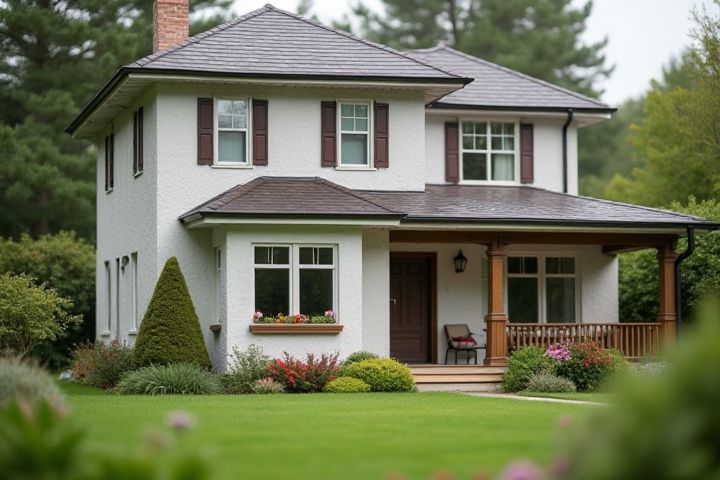
Regular maintenance of a house involves several key areas to ensure safety, efficiency, and longevity. Inspecting your roof twice a year can prevent leaks and costly repairs. Maintaining HVAC systems, including changing filters regularly, improves energy efficiency and air quality. Keeping gutters clear and downspouts directed away from the foundation helps prevent water damage and mold growth. Finally, addressing any minor repairs immediately can avoid larger issues down the line, saving you both time and money.
How To Maintain A House
Regular cleaning and decluttering
Regular cleaning habits, such as dusting surfaces and vacuuming floors at least once a week, can significantly enhance your home's appearance and hygiene. Decluttering is equally essential; aim to evaluate your belongings every three months, discarding or donating items you no longer use to create a more organized space. Consider establishing a daily 15-minute tidy-up routine to keep surfaces clear and prevent accumulation of clutter. This dual approach not only maintains an inviting environment but also contributes to a more efficient household.
Seasonal maintenance checks
Regular seasonal maintenance checks are crucial for preserving your home's integrity and efficiency. During spring, inspect your roof, clean gutters, and service your HVAC system to ensure optimal air quality and comfort. In summer, check exterior paint for peeling and maintain your landscaping to prevent water damage. Autumn is the perfect time to evaluate insulation and seal drafty windows, while winter requires monitoring plumbing for potential freezing and ensuring heating systems function correctly.
Efficient energy use and insulation
To enhance efficient energy use in your home, prioritize high-quality insulation materials, such as spray foam, fiberglass, or cellulose, which can reduce heating and cooling costs by up to 30%. Sealing gaps around windows, doors, and ducts can further prevent energy loss, ensuring your home maintains a stable temperature. Investing in energy-efficient appliances, labeled with the ENERGY STAR rating, can also lead to a 10-50% reduction in energy consumption. Consider implementing smart home technologies, like programmable thermostats, that allow you to control energy use more effectively, saving you both money and resources.
Plumbing and leak inspections
Regular plumbing inspections are essential for preventing costly water damage and maintaining your home's value. Aim for a professional leak inspection at least annually, which can identify issues like pipe corrosion, faulty seals, and hidden leaks before they escalate. You should also routinely check your water bill; a sudden increase could indicate an unnoticed leak. Ensure that all faucets, toilets, and appliances are inspected for drips and proper function, contributing to better water efficiency and a reduced risk of plumbing emergencies.
Heating, ventilation, and air conditioning upkeep
Regular maintenance of your HVAC system is crucial for optimal performance and energy efficiency. Schedule annual inspections to clean or replace air filters every 1-3 months, which can improve indoor air quality by up to 50%. Ensure that your heating and cooling units are serviced by a professional at least once per year, maintaining the lifespan of your equipment, potentially extending it by 5-10 years. Keep vents and outdoor units clear of debris, as proper airflow can enhance system efficiency, saving you up to 20% on energy bills.
Roofing and gutter maintenance
Regular roof inspections, ideally twice a year and after severe weather events, help identify issues such as leaks or damaged shingles. Ensure your gutters are cleaned at least twice annually to prevent debris buildup, which can lead to water damage or mold growth. Installing gutter guards can further reduce maintenance frequency by preventing leaves and twigs from clogging the system. If you notice any signs of wear, such as rust or missing shingles, promptly schedule a repair to protect the overall integrity of your home.
Pest prevention and control
Regularly inspect your home for potential pest entry points, such as gaps in windows, doors, and foundations, to maintain a pest-free environment. Seal any cracks or openings with caulk or weather stripping, and ensure that screens are intact to prevent insects from entering. Keep your property clean by promptly disposing of trash and storing food in sealed containers, as up to 75% of pests are attracted to human food sources. Consider professional pest control services quarterly, which can reduce the risk of an infestation by up to 90%, ensuring your home remains a safe and comfortable haven.
Lawn care and landscape management
Maintaining a healthy lawn requires consistent mowing at a height of approximately 2.5 to 3.5 inches, along with regular watering of about 1 to 1.5 inches per week, ideally done early in the morning to minimize evaporation. Fertilizing your lawn with nitrogen-rich products can promote robust growth--aim for applying fertilizer in the spring and late summer. For landscape management, consider incorporating native plants that require less water and are easier to maintain, enhancing biodiversity in your garden. Regularly checking for pests and diseases can prevent infestations; using organic pesticides can be an effective and environmentally friendly method.
Appliance inspections and servicing
Regular appliance inspections are crucial for maintaining the efficiency and longevity of your home's essential systems. Schedule routine servicing for appliances such as refrigerators, ovens, and washing machines to prevent breakdowns and enhance energy efficiency. It's important to check for signs of wear, including unusual noises or leaks, which can indicate potential issues. By prioritizing proper maintenance, you ensure safety and functionality while saving on potential costly repairs in the future.
Home security systems monitoring
Home security systems monitoring has become an essential aspect of maintaining a safe environment. Modern systems often include 24/7 monitoring services that can alert authorities within seconds in case of a breach, significantly increasing response times. It's advisable to choose systems equipped with smart technology, such as cameras, motion detectors, and alarms, which can be accessed remotely via smartphone applications. Regularly updating your security software and conducting yearly checks on equipment ensures that your home remains well-protected against potential threats.
